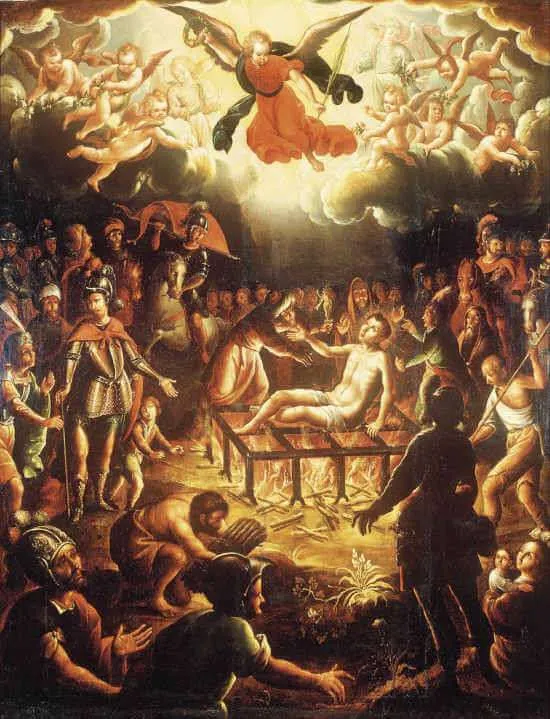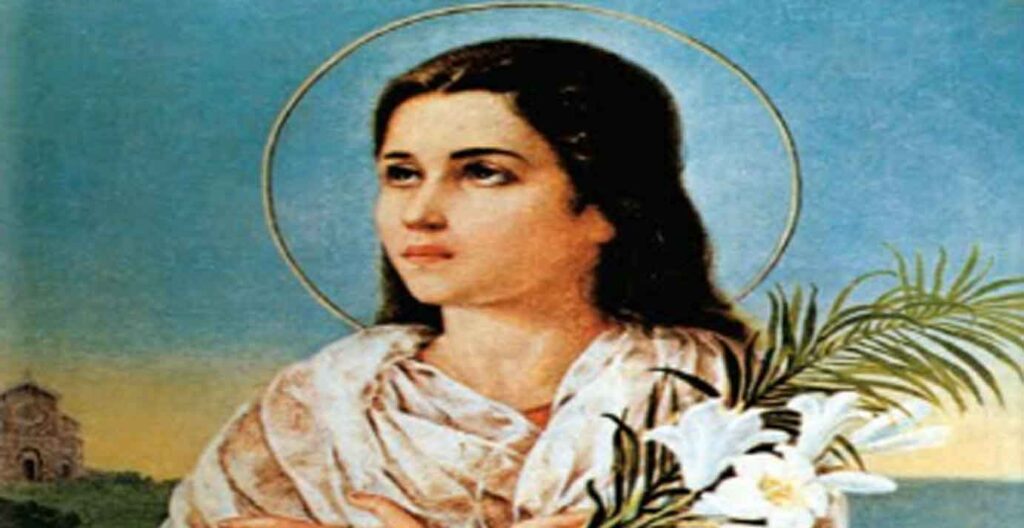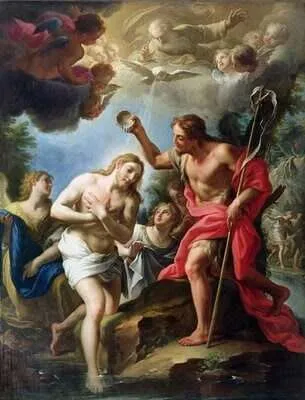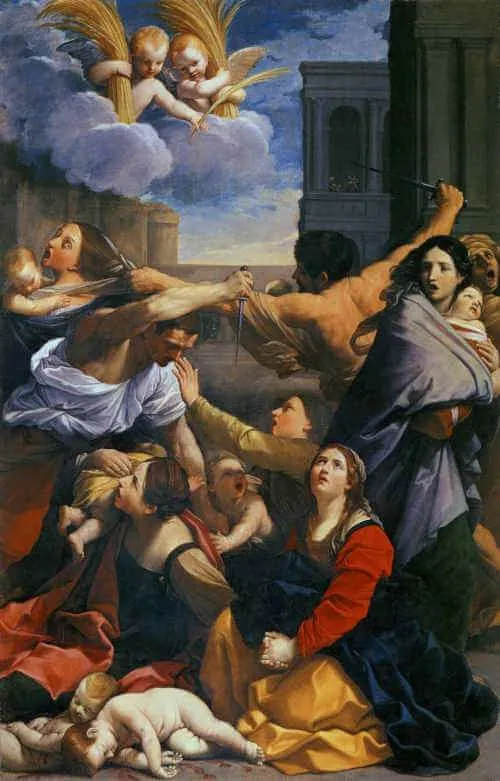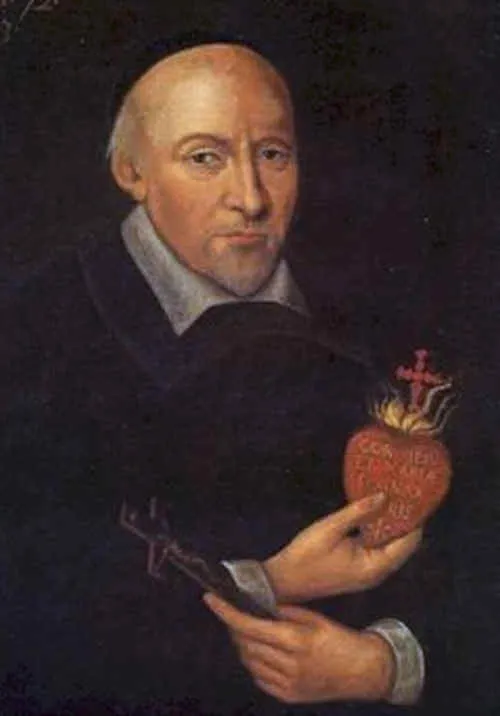c. 225–c. 258; Patron Saint of archivists, armories, book lovers, brewers, butchers, cooks, comedians, deacons, glaziers, laundry workers, librarians, firefighters, poor people, restaurateurs, schoolchildren, seminarians, tanners, vine growers, winemakers, and Rome; Invoked against fire and lumbago (lower back pain); Pre-Congregation canonization
Though not much is known for certain about Saint Lawrence, he has been highly revered as a martyr and deacon from at least the fourth century. Most of the legends come from the detailed writings of Saint Ambrose, who served as Bishop of Milan from 374 to 397, more than a century after Saint Lawrence’s death. His writings are likely more of an imagined telling of the story than a literal account. Another early source of Saint Lawrence’s life and martyrdom comes in the form of a Latin poem written by the Christian poet Prudentius, who lived c. 348–c. 405. Finally, the later Passio Sancti Laurentii gives other details about Saint Lawrence, which comes from an anonymous Spanish author who most likely did not write until the fifth or sixth century. From these three sources, as well as from the writings of others, such as Saint Augustine of Hippo and Pope Saint Gregory the Great, great reverence and devotion to Saint Lawrence have flourished throughout the centuries. He is even one of the few early martyrs named in Eucharistic Prayer I (the Roman Canon). It is for these reasons that today’s celebration holds the rank of Feast within our Church.
According to these legends, Lawrence was born in Spain, perhaps at Osca in Aragon, near the foot of the Pyrenees mountains. Both of his parents are believed to have been martyrs. As a youth, he is said to have been brilliant, studying humanities and theology in Zaragoza where he met the future Pope Saint Sixtus II. After Lawrence completed his studies, he and the future pope traveled to Rome. In Rome, Lawrence was ordained one of the city’s seven deacons—most likely as the head of the seven deacons, the Archdeacon of Rome. As archdeacon, Lawrence was put in charge of the Church’s material possessions and was responsible for distributing alms to the poor. By the time Pope Sixtus II was elected pope in 257, he and Deacon Lawrence are believed to have had a strong friendship.
In 253, Valerian became the Roman Emperor. At first, he tolerated Christians. However, in 257 he issued an edict that began a fierce persecution of the Church. Saint Cyril, then the bishop of Carthage, North Africa, who also died a martyr under Valerian, described the persecution this way: “The Emperor Valerian has consigned to the Senate a decree by which he has determined that all Bishops, Priests and Deacons will be immediately put to death. I communicate to you that Sixtus suffered martyrdom on 6 August together with four Deacons while they were in a cemetery. The Roman authorities have established a norm according to which all Christians who have been denounced must be executed and their goods confiscated by the Imperial treasury.” The Liber Pontificalis identifies two other deacons who were martyred with Pope Sixtus, for a total of six deacons on August 6, 258: Januarius, Vincentius, Magnus, Stephanus, Felicissimus, and Agapitus.
According to Saint Ambrose’s account, Deacon Lawrence was martyred four days after his close friend and spiritual father, Pope Sixtus II, and the other deacons who were put to death. Ambrose records this exchange between the two prior to the pope’s execution, “Saint Lawrence wept when he saw his Bishop, Sixtus, led out to his martyrdom. He wept not because he was being led out to die but because he would survive Sixtus. He cried out to him in a loud voice: ‘Where are you going Father, without your son? Where do you hasten to, holy Bishop, without your Deacon? You cannot offer sacrifice without a minister…’” Ambrose records Pope Sixtus as responding, “I will not leave you, I will not abandon you my son. More difficult trials are kept for you. A shorter race is set for us who are older. For you who are young a more glorious triumph over tyranny is reserved. Soon, you will see, cry no more, after three days you will follow me…”
After Pope Sixtus and the other deacons were martyred, Deacon Lawrence was arrested. Because he was in charge of the riches of the Church, the prefect of Rome demanded that Deacon Lawrence hand over to him all the treasures of the Church. Lawrence requested three days to gather them, during which time he distributed all he could to the poor. After three days, Deacon Lawrence appeared again before the prefect and pointed to the poor, the crippled, the blind, and the suffering of Rome, saying, “These are the treasures of the Church.” This infuriated the prefect who had anticipated receiving gold and silver. He ordered that Deacon Lawrence be burned on a gridiron. Saint Ambrose records Deacon Lawrence’s last act of heroic virtue and defiance of diabolical oppression this way: “However, after three days he was placed upon the gridiron by the tyrant whom he mocked, and was burnt. He said: ‘The flesh is roasted, turn it and eat.’ So by the courage of his mind he overcame the power of fire.”
What is known for certain is that Saint Lawrence of Rome gave his life for Christ. After that heroic act of selflessness, God raised Saint Lawrence back to life—not physically, but spiritually, making him an icon of Christ to inspire others. Because Saint Lawrence is believed to have been burned on a gridiron, he has become known as the patron saint of cooks and tanners. Because he cared for and hid important documents of the Church before dying, he is the patron saint of archivists and librarians. And because of the humor Lawrence displayed while dying, as recorded by Saint Ambrose, he is the patron saint of comedians. From the third century onward, Saint Lawrence has been highly venerated in Rome and is considered a patron of Rome, after Saints Peter and Paul. After Constantine the Great legalized Christianity in the fourth century, tradition holds that he built a basilica over the tomb of Saint Lawrence that became one of the seven main churches in Rome, the Basilica di San Lorenzo fuori le Mura.
As we honor this legend of heroic virtue within the Roman Church, ponder not only his courage but also the way that God has used him to inspire many throughout the centuries. Though acts of courage may be difficult at the time they are performed, the good fruit of such heroism lives on. Seek the intercession of Saint Lawrence today, asking him to pray for you so that you will have the courage to do all that God asks of you, even using humor when helpful, so that you will find joy in everything, even persecution and suffering.
Source: https://mycatholic.life/saints/saints-of-the-liturgical-year/august-10—saint-lawrence-deacon-and-martyr/


